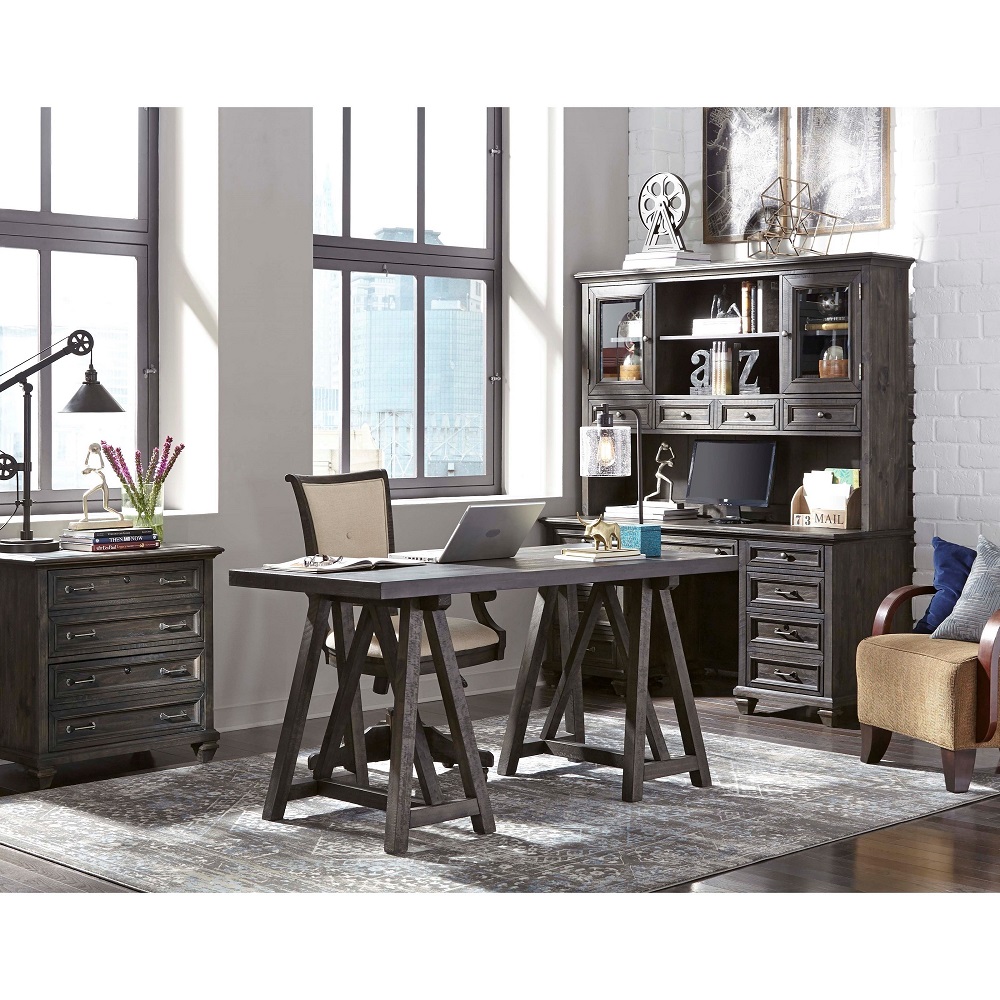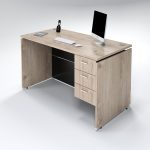Assessing Your Space
Before choosing a home office desk, assess the space to find the best fit. Consider these points:
Measurements: Check the room’s dimensions. Note the length, width, and height available for your desk.
- Layout: Think about door and window placements. Ensure the desk won’t block natural light or movement.
- Electrical Outlets: Locate outlets for easy access. Avoid using extension cords over long distances.
- Lighting: Identify where the light falls during your working hours. You might need additional lamps or task lighting.
- View: Position your desk to face a pleasant view if possible. It can boost your mood.
By carefully evaluating your space, you set the stage for a productive and comfortable home office.
Desk Types and Materials
When you start your search for a home office desk, the variety can be overwhelming. It’s important to consider both the types of desks and the materials they are made from. Here are the main types you will encounter and the materials commonly used for each:
- Writing Desks: Simple, flat surfaces ideal for laptop use and writing tasks. Often made from wood or MDF.
- Computer Desks: Designed to accommodate desktop PCs. They may include keyboard trays and cable management solutions. Materials range from glass, metal, to engineered wood.
- Executive Desks: Large, often imposing desks with a spacious surface and multiple drawers. Common materials include solid woods and high-quality veneers.
- Standing Desks: Adjustable desks allowing you to stand while working. Materials may include a metal frame with a wood or laminate top.
- L-Shaped Desks: Fit well in corners, providing ample space. They are typically crafted from wood, glass, or metal.
- U-Shaped Desks: Offer a lot of workspace and storage. These are usually made with a mix of wood, metal, and high-quality laminates.
The choice of material for your home office desk impacts both aesthetics and durability. Wood offers a classic look but requires more care. Metal desks are strong and give a modern feel. Glass desks are sleek but can show fingerprints and require careful cleaning to prevent scratches.
Your selection should align with your needs and the style of your home office. Consider these factors alongside your personal taste when choosing your home office desk.
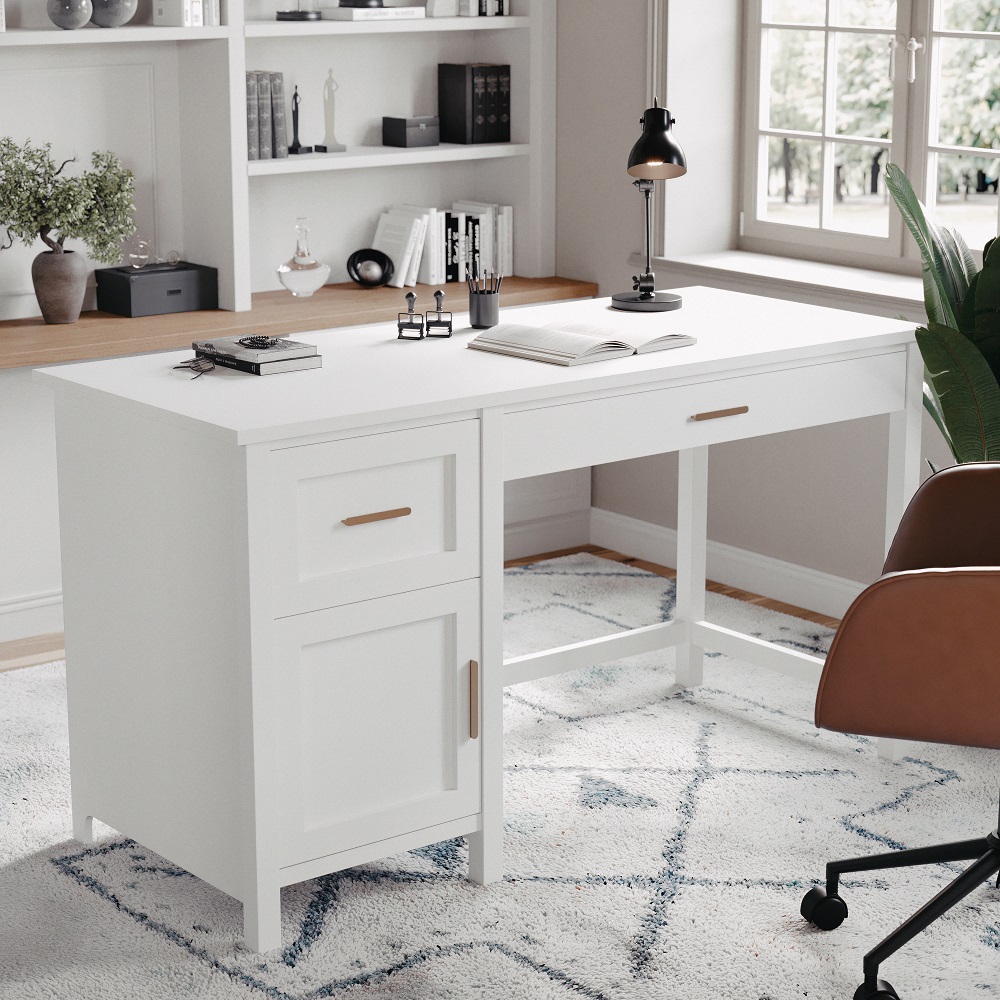
Ergonomics and Comfort
When selecting a home office desk, ergonomics and comfort should be top priorities. An ergonomically designed desk can prevent discomfort and strain during long work hours. Here are key aspects to consider for maximizing ergonomic benefits:
- Adjustable Height: Choose a desk with adjustable height options. This feature allows you to change your working position and maintain proper posture whether sitting or standing.
- Desk Shape: Consider an L-shaped or U-shaped desk if you frequently multitask. These shapes provide ample space and can help reduce excessive reaching or twisting.
- Chair Compatibility: Ensure your office chair fits well with the desk. The chair’s height should allow your feet to rest flat on the floor while keeping your wrists in a neutral position when typing.
- Monitor Placement: Position your monitor at eye level and at a suitable distance to avoid eye strain and neck pain. Use monitor stands if necessary to achieve the ideal setup.
Taking the time to ensure your home office desk supports good ergonomics and offers comfort can greatly enhance productivity and wellbeing. Consider these factors carefully when choosing the perfect home office desk.
Storage and Organizational Features
When choosing your home office desk, consider storage and organizational features carefully. These add function and can greatly impact your workflow. Think about these points:
- Drawer Space: Look for desks with ample drawers. This helps keep your essentials at arm’s reach.
- Cable Management: Opt for desks with built-in cable holes or compartments. It keeps your space tidy and safe.
- Shelving Units: Some desks come with attached shelves. These are great for books and decor.
- Hutches: A hutch adds vertical storage. This is perfect for small spaces.
- Keyboard Trays: A sliding tray tucks your keyboard away when not in use.
- File Storage: Consider desks with dedicated file drawers. It organizes documents better.
Make sure the storage solutions suit your work habits. A clutter-free desk is more inviting and promotes focus. Think about your workflow and the tools you use most. Choose a home office desk that offers both smart storage and easy organization.
Style and Aesthetics
When selecting a home office desk, style and aesthetics are just as vital as functionality. Aim for a desk that complements the interior look of your home. Using the right style can also influence your mood and productivity. Keep these elements in mind:
- Design Style: Choose a desk that reflects your personal style. It could be traditional, contemporary, or even minimalist.
- Color Scheme: Pick a color that fits with your home office palette. Neutrals offer flexibility, while bold colors can make a statement.
- Texture and Finish: Look at the texture and finish of the desks. They add depth and character to your workspace.
- Harmony with Decor: Ensure your desk goes well with other furnishings. It should enhance the room’s overall appeal.
- Personal Touch: Consider space for personal items. Photos or plants make your space more enjoyable.
With style in mind, choose a desk that boosts your morale and sits well in your home office environment. A pleasing aesthetic can make your workspace a place where you love to spend time. Balance beauty with utility for the best home office setup.
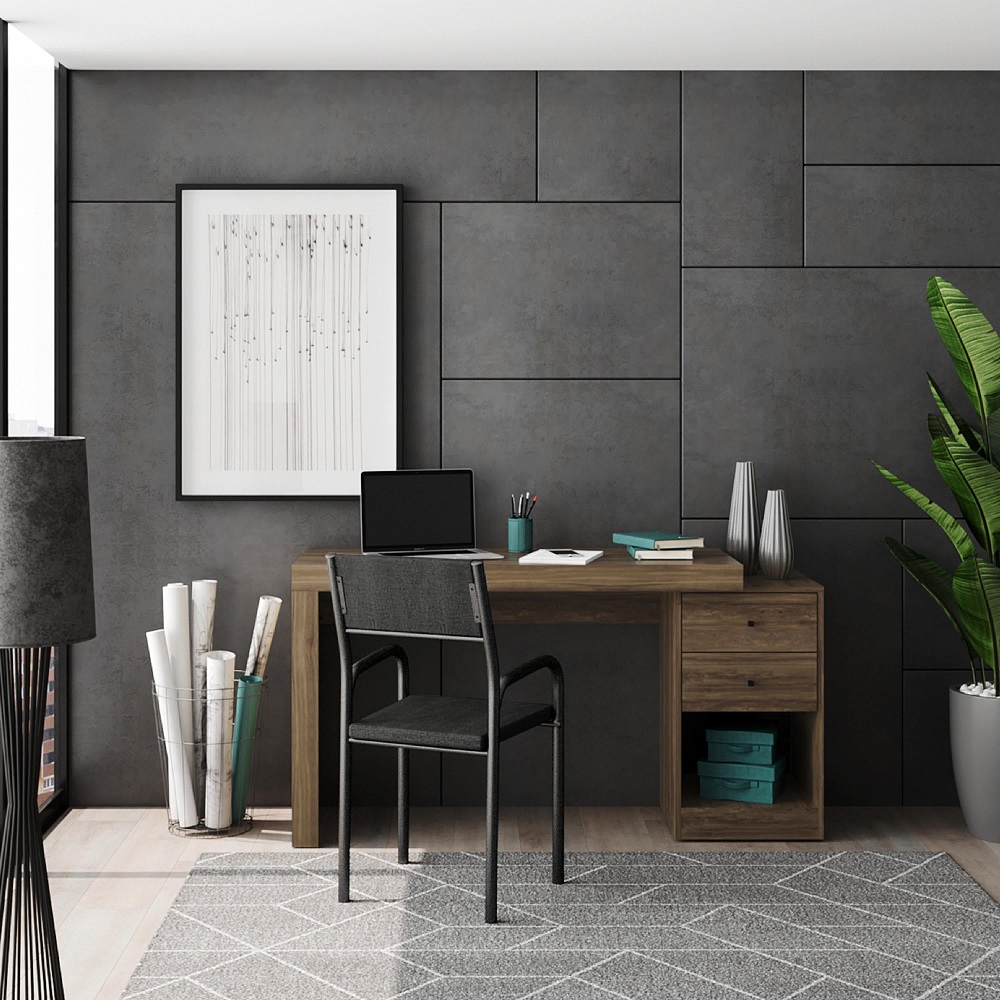
Price and Budget Considerations
When deciding on a home office desk, your budget is a key factor. A well-chosen desk should fit within your financial means without compromising on necessities. Here’s how to balance cost with quality:
- Set a Budget: First, determine how much you’re willing to spend. This helps narrow your options.
- Cost vs. Quality: Cheaper desks may save money initially but could cost more long-term if they wear out quickly. Balance initial cost with potential durability and longevity.
- Investment in Comfort: Don’t skimp on ergonomics. A desk that prevents aches and pains is worth the investment.
- Look for Deals: Check for sales, discounts, or used desks in good condition to save money.
- Prioritize Features: Decide which features you can’t do without and which you can compromise on to stay within budget.
- Long-Term View: Consider if the desk will serve your needs as they evolve over time.
By considering these points, you’ll be well on your way to finding a home office desk that respects your budget while meeting your needs. Remember, the right desk is an investment in your productivity and comfort.
Popular Brands and Reviews
When selecting a home office desk, considering popular brands can guide your decision. Reviews help understand the real-world performance and quality of desks. Here are some reputable brands and their common reviews:
- IKEA: Known for affordability and modern designs. Reviews often praise their functional yet stylish options. Some critiques mention assembly difficulties.
- Herman Miller: A leader in ergonomic furniture. Reviews usually highlight exceptional comfort and durability but note the higher price point.
- Sauder: Offers a range of wood-finished desks that blend well with home decor. Positive reviews often focus on the aesthetic appeal and sturdy build. However, some users find the assembly instructions complex.
- Bush Furniture: Known for robust and spacious designs. Reviews typically commend the desk stability and ample storage, with some noting longer assembly times.
- Fully: Favored for adjustable standing desks. Reviews consistently laud the ease of height adjustment and sleek design, although costs can be high.
Always check customer reviews to gauge the satisfaction of other users. This helps prevent potential disappointments and ensures you invest in a home office desk that meets your expectations and needs. Consider warranty and customer service reviews as well, as these can influence your overall satisfaction and the desk’s longevity.
Sustainability and Eco-Friendly Options
When you choose a home office desk, consider eco-friendly options. These desks benefit our planet. Many brands now offer desks from sustainable materials. These include reclaimed wood, bamboo, and recycled metal. Such materials reduce waste and deforestation. Durability is also a feature of eco-friendly desks. They often last longer and need fewer replacements. This can save resources in the long run.
Here are ways to find a green desk:
- Certified Sustainable Wood: Look for desks with certifications like FSC. This ensures the wood comes from responsibly managed forests.
- Recycled Materials: Pick desks made from recycled metals or plastics. It limits demand for new raw materials.
- Non-Toxic Finishes: Select desks with natural oils or water-based finishes. They are safer for indoor air quality.
- Modularity and Recyclability: Consider desks that you can easily disassemble. This makes them easier to recycle at the end of their life.
- Local Sourcing: Buying desks made close to home can reduce carbon emissions from transport. Try to find local artisans or manufacturers.
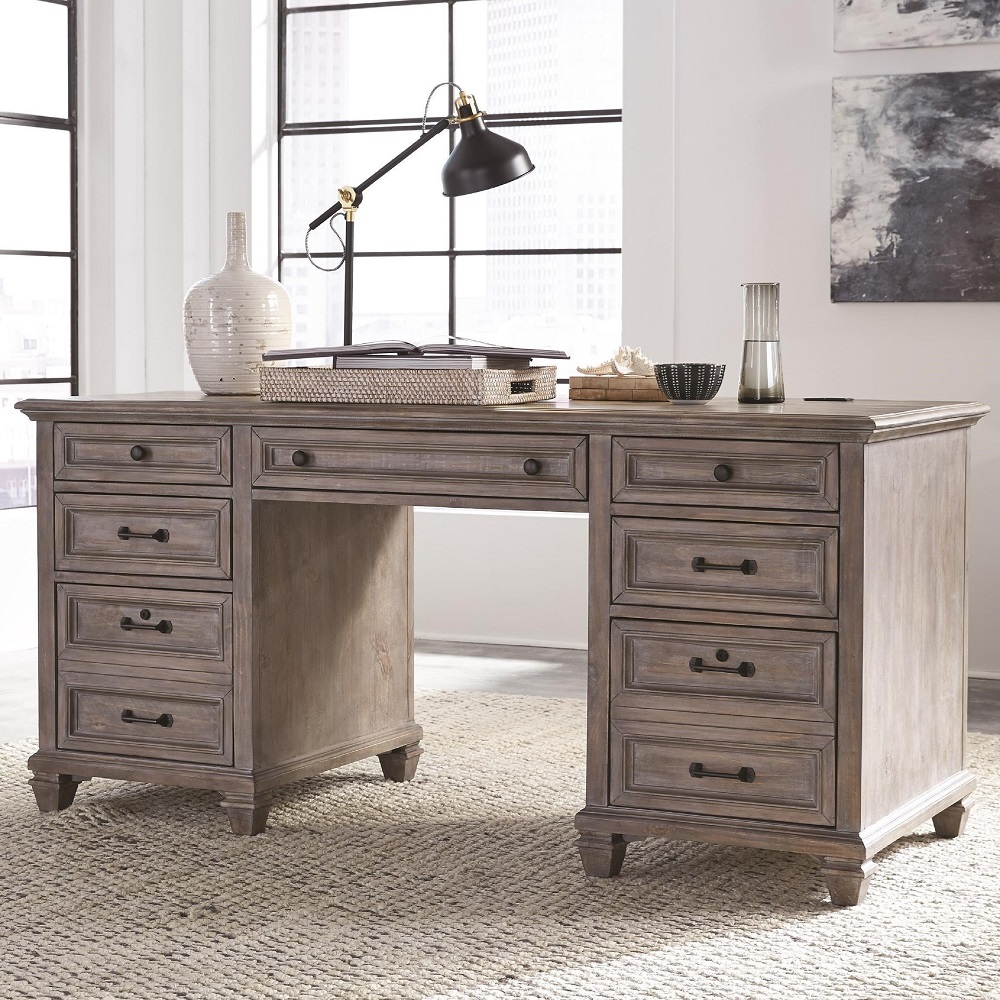
Remember, a sustainable home office desk is a choice that supports a healthy environment. It also provides a sense of personal well-being and responsibility. By prioritizing sustainability, your workspace can inspire and reflect your values.
